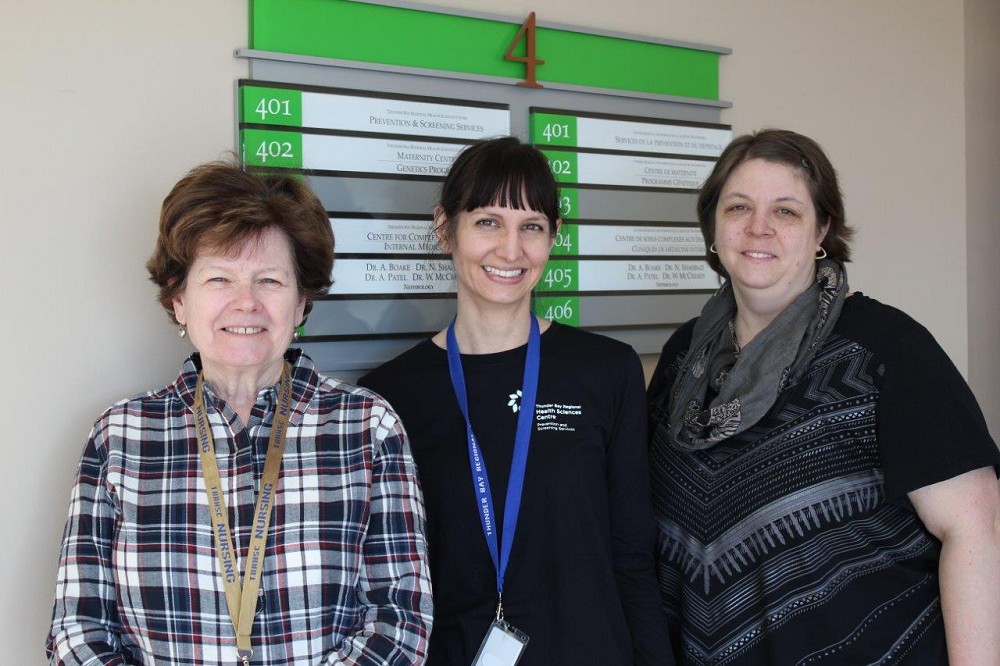Genetic Counselling: Know the Facts
by Sara Chow
 Thunder Bay Regional Health Sciences Centre’s Genetics Program staff, (from left) Janice Little, Genetics Nurse, Leanne Mercer, Genetic Counsellor, Jen Doig, Receptionist. Missing is Taylor Speziale, Program Assistant.
Thunder Bay Regional Health Sciences Centre’s Genetics Program staff, (from left) Janice Little, Genetics Nurse, Leanne Mercer, Genetic Counsellor, Jen Doig, Receptionist. Missing is Taylor Speziale, Program Assistant.‘I’m not interested in genetic testing, why should I see a genetic counsellor?’. This is a common concern that Genetic Counsellor, Leanne Mercer, is trained to help her patients with at Thunder Bay Regional Health Sciences Centre’s Genetics Program. Mercer, who completed a master’s degree in genetic counselling, has spent the last 13 years of her career dedicated to the most recent research, guidelines and information in the realm of genetics. Now, she has answered some of the most common inquiries, myths and questions about genetics and genetic counselling so that you know the facts.
What is genetic counselling?
Genetic counselling is a discussion about how genetic conditions are inherited, and the associated health implications of the condition. A typical appointment is about one hour in length, and we will talk about the chance that someone has inherited a genetic condition, if there is a treatment for the condition, if genetic testing is available, as well as implications for other family members.
If I am referred to the Genetics Program, does this mean I will get tested for genetic conditions?
Many people think that if they come to see me for an appointment that they will get genetic testing, but that is not always the case. The ‘counselling’ part can really be thought of as a discussion so that patients can get the information that they need about the genetic condition in their family. Sometimes there isn’t a genetic test to offer or it’s not appropriate for a variety of reasons. If genetic testing is offered we talk about whether or not testing is right for them. Together, we discuss the pros and cons of testing and why they might want to know or might not want to know. This would also include a discussion about the potential implications for other family members.
My goal is to help my patients get the information they need to make the right choice for them. There is no pressure for patients to follow through with testing; that decision is entirely up to them. Some people decide they want testing at their appointment, in which case we will complete the paperwork, and some people don’t know and need to go home to think about it. Both scenarios are perfectly fine.
I don’t need the counselling, I just want to complete the genetic testing.
It is really important to get the correct information about the genetic condition for which we are testing for. We want our patients to fully understand the implications of genetic testing before they have their blood taken. The ‘counselling’ portion isn’t counselling as we traditionally think about it, it’s really more of an information discussion.
I’m worried about getting tested because I don’t want to be discriminated against.
On May 4, 2017 the Genetic Non-Discrimination Act (GNA) was passed into law in Canada. The GNA protects individuals from the use of genetic test results in areas outside of medical care and medical research, such as insurance and employment. Under the GNA, providers of goods and services, including insurance providers, cannot request or require that a person undergo genetic testing and they cannot request or require the disclosure of previous or future genetic test results.
The GNA was enacted to protect Canadians from discrimination. Should someone decide to undergo genetic testing, currently this information would not be made available and cannot be requested by providers of goods and services.
More information about the Genetics Program
If you are looking for more information about our Hospital’s Genetics Program and how to be referred, visit www.tbrhsc.net/genetics.